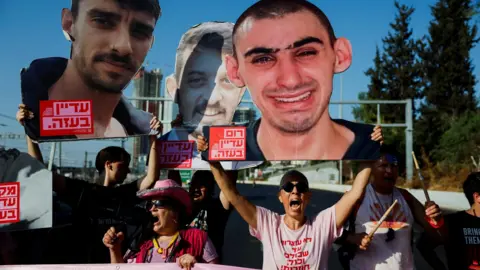**Mediators Await Israeli Response to New Gaza Ceasefire Proposal**
Arab mediators are currently awaiting a formal reaction from the Israeli government after Hamas announced its acceptance of a new ceasefire and hostage release proposal. This plan was put forth by Qatar and Egypt, both of which are attempting to avoid a catastrophic escalation that would lead to a full-scale Israeli occupation of Gaza.
The ceasefire proposal is reportedly “almost identical” to a previous initiative from the United States that aimed for a 60-day truce. Under this agreement, around half of the 50 hostages held in Gaza—estimated at about 20 individuals believed to still be alive—would be released, and negotiations for a long-term ceasefire would commence. Recently, however, Israeli officials have made it clear that their government is no longer willing to accept a partial agreement, insisting on a comprehensive solution that entails the release of all hostages.
Local media have quoted a senior Israeli official affirming that Israel’s collective stance remains unchanged: they demand the release of all hostages and the fulfillment of preset conditions for concluding the ongoing war. Furthermore, it is expected that later this week, the Israeli cabinet will endorse plans from the military to occupy Gaza City, following a significant rise in Israeli aerial strikes that have already caused mass displacement among thousands in the region.
Israeli Prime Minister Benjamin Netanyahu expressed that Israel’s objective is to fully conquer Gaza, encompassing areas where many of its 2.1 million Palestinian inhabitants have found refuge. His remarks come after a setback in indirect negotiations with Hamas aimed at securing a ceasefire last month.
On the other hand, on Monday evening, Hamas declared that the armed group, along with other Palestinian factions, had endorsed the ceasefire proposal introduced by Egyptian and Qatari mediators during discussions in Cairo the previous day. Key Hamas official, Taher al-Nunu, shared with Al-Araby TV that there were no calls for amendments to the proposal, labeling it as a “partial deal leading to a comprehensive deal.” He indicated optimism that the ceasefire, lasting 60 days, would suffice to finalize an agreement that would permanently mitigate conflict in the area.
Majed al-Ansari, a spokesperson for Qatar’s Ministry of Foreign Affairs, conveyed that the latest proposal closely mirrors the plan advanced by U.S. Middle East envoy Steve Witkoff. Al-Ansari disclosed that while some specifics remain confidential, the general framework aligns closely with earlier propositions.
For context, Witkoff’s original proposal entailed a truce lasting 60 days, during which Hamas would release 10 hostages believed to be alive and return the bodies of 18 deceased hostages in exchange for numerous Palestinian prisoners currently detained in Israel. It was declared that negotiations for a conclusive agreement to end hostilities would commence from day one of the ceasefire. While Israel was receptive to Witkoff’s plan, Hamas voiced their concerns over its lack of assurances regarding the pathway from a temporary to a permanent ceasefire.
Israeli officials, meanwhile, are weighing the newly presented proposal and Hamas’s response. Reports have surfaced indicating that Netanyahu has not completely dismissed the prospect of accepting a partial agreement, despite prior statements advocating for a comprehensive settlement. His office recently communicated that Israel would consent to a deal only on the precondition that all hostages are released simultaneously and under terms aligned with Israel’s criteria for ending the hostilities.
These conditions encompass the disarmament of Hamas, the demilitarization of Gaza, the establishment of Israeli control over the Gaza perimeter, and the implementation of a governance structure devoid of Hamas or the Palestinian Authority.
On a global front, U.S. President Donald Trump remarked via social media that the successful return of remaining hostages is contingent upon confronting and dismantling Hamas.
The families of hostages are expressing concern that any renewed military action in Gaza City may jeopardize the safety of their loved ones. On Sunday night, significant crowds protested in Tel Aviv, urging the Israeli government to negotiate a deal with Hamas to end the conflict and ensure the safe return of all hostages currently in captivity. In response, Netanyahu accused demonstrators of impairing Hamas’s willingness to negotiate.
Since the outbreak of Israeli military action in Gaza following the deadly Hamas-led attack on southern Israel on October 7, 2023, more than 62,000 individuals have reportedly lost their lives in Gaza according to the territory’s Hamas-controlled health ministry. The humanitarian crisis continues to escalate, with most of Gaza’s population enduring recurring displacements, the destruction of over 90% of housing, and the breakdown of essential healthcare and sanitation systems, raising alarm over severe food shortages and conditions heading toward famine.
This information underscores the dire situation each faction faces as discussions for peace and resolution persist amid widespread loss and suffering on both sides.












